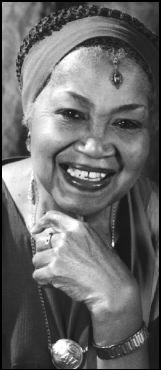ODETTA
Century Ballroom, 324-7263, $22 8 p.m. Sun., Oct. 14
FORGET ALICIA KEYS and Macy Gray; at 70 years old, Odetta is cooler than both of them put together. A champion of civil rights, she marched on Selma with Dr. Martin Luther King Jr., performed for JFK on national TV, and inspired the masses at the 1963 March on Washington. Musically, she directly influenced not only Joan Baez and Bob Dylan (who traded in his electric guitar for a flat-top Gibson acoustic after hearing her 1956 debut album) but Janis Joplin and Nick Cave, too. Her ditty “Hit Or Miss” pops up on Cut Chemist and DJ Shadow’s Brainfreeze mix CD, and in John Waters’ Hairspray, the celebrated African-American protest singer gets name-checked by Pia Zadora. How’s that for hipster cachet?
On her latest album, Odetta pays homage to one of her greatest forebears: Hudie Ledbetter, better known as Leadbelly. “I never did see him live; only heard him on record,” she admits. “But he definitely influenced me.”
Like Leadbelly, Odetta’s repertoire has long drawn on a uniquely American blend of folk, blues, lullabies, and love- and work-song traditions. All those aspects of their shared heritage are explored in the 15 selections on Lookin For A Home: Thanks to Leadbelly (M.C. Records), from the romantic standard “Goodnight Irene” to political tunes (“Bourgeois Blues,” “Jim Crow Blues”) that still sting, well over half a century after their composition.
One of the album’s highlights is a medley of the traditional “Julie Anne Johnson” with Ledbetter’s “Whoa Black Buck”; in the rhythmic rise and fall, the echoes of rocks being pounded into cement and of railroads being built ring out once more. But the call-and-response music of the American laborer is hardly new terrain to Odetta.
“Work songs awakened me,” she says. At the age of 19, the Los Angeles native went to San Francisco with a production of Finian’s Rainbow and soon found herself caught up with the Bohemian set. After the bars closed, she would gather with like-minded souls at the garret apartment of her old school chum Joanne Mapes. “And people would sit around and sing these songs,” she recalls.
In the postwar era of segregation and divisive racism, here were “songs that dealt with what my anger was, what my frustration was.” Friends loaned her a guitar and taught her a few chords, and she channeled her passions into this newly discovered medium. “I could rant and rave within the music,” she remembers. “I couldn’t say, ‘I hate you, I hate me, I hate everything. . . ,’ but I could get through that energy via these songs. And that has healed me. It’s not that I don’t get angry. I get angry at what people do. But I don’t hate anymore.”
BORN IN BIRMINGHAM, Ala., on Dec. 31, 1930, Odetta (who dropped her surname at the beginning of her career when a club owner told her patrons wouldn’t be able to pronounce it) was already pursuing a different musical career when she arrived in San Francisco. But while a childhood spent listening to big bands, opera, and pop came to bear on her expansive artistry, she feels the benefits of adolescent vocal training bear little influence on how she has performed the music on which her reputation is built.
“Classical music did not teach me anything about emotion, but it taught me technique,” she insists. Consequently, her tones remain richer and fuller than those of many women half her age. “I bless my teachers for that, for sure. But classical music is nowhere involved in what I do, except for how to produce [the sound] and stay away from making mistakes with the throat and the body.”
After taking a 14-year break from recording (“I had a great deal of respect through the [record] industry, but they didn’t know what to do with me”), Odetta resumed making albums last year, earning a Grammy nomination for Blues Everywhere I Go. In 1999, Bill Clinton awarded her a Presidential Medal of the Arts. Yet Odetta spends little time dwelling on these or her many other achievements, including a fondly remembered stint as artist in residence at Olympia’s Evergreen State College. “There are glowing spots,” she says of her memories, “but I don’t really go back.”
Odetta has provided the soundtrack from America during some of our nation’s most turbulent times, and she continues to do so now. Just days after the World Trade Center catastrophe, she performed with the Boys Choir of Harlem on The David Letterman Show. “It is possible to heal with music,” she reaffirms. But she wisely acknowledges that not all musicians are destined, or equipped, to provide that service.
“As Eeyore says, ‘Some do, and some don’t,'” she chuckles. For those who don’t, fear not—Odetta is still here to pick up the slack.






